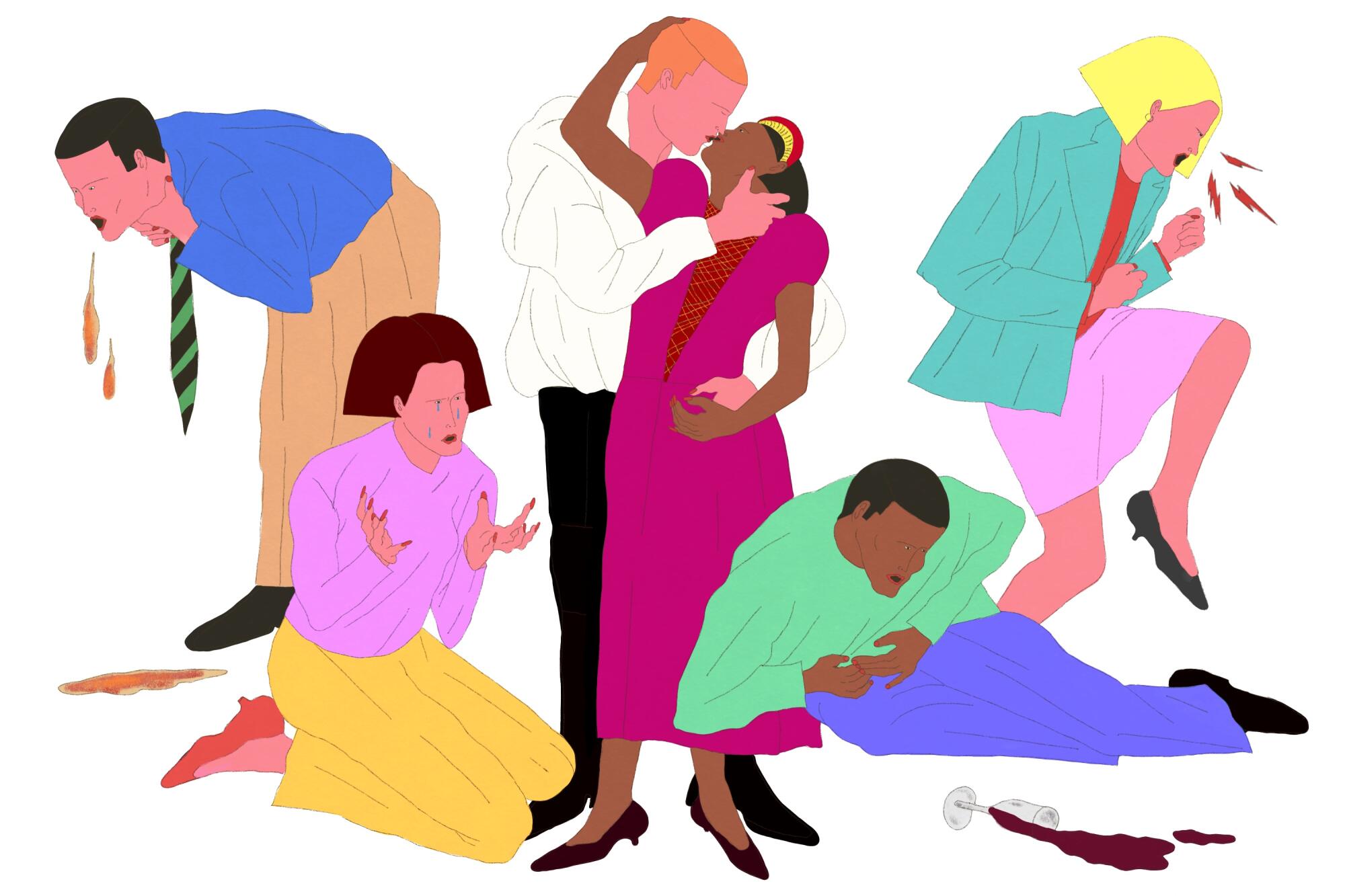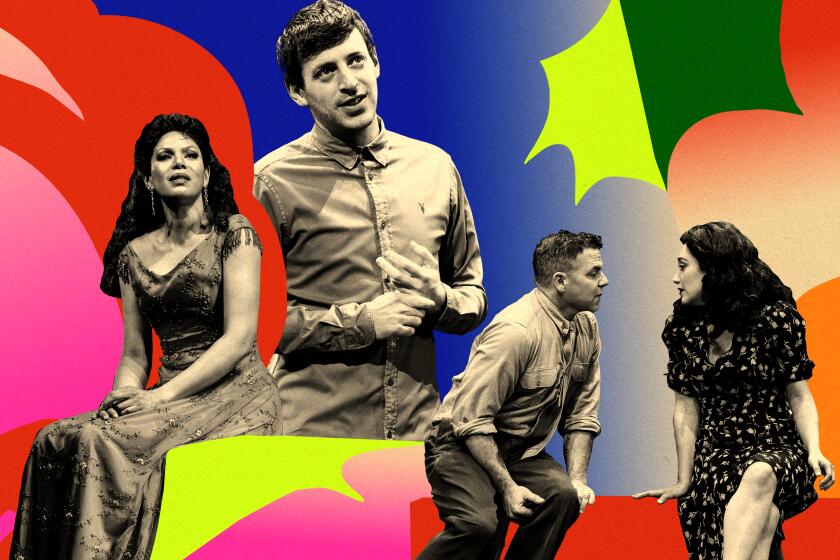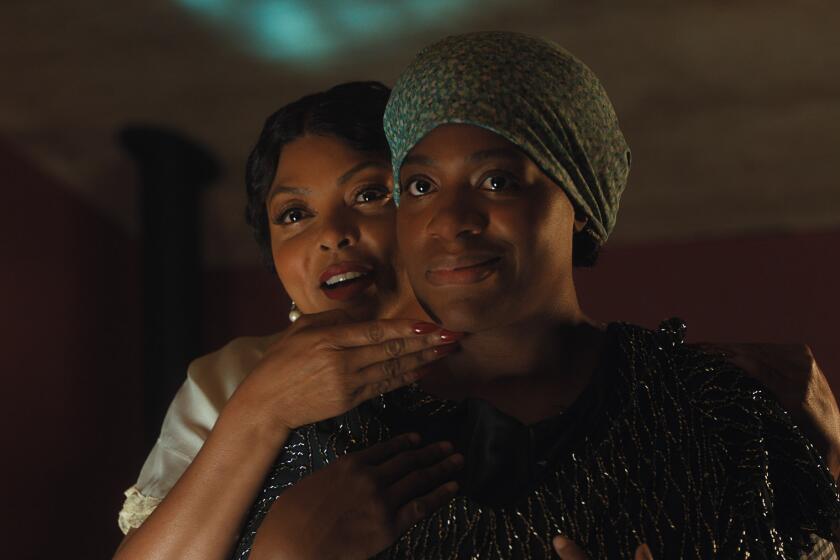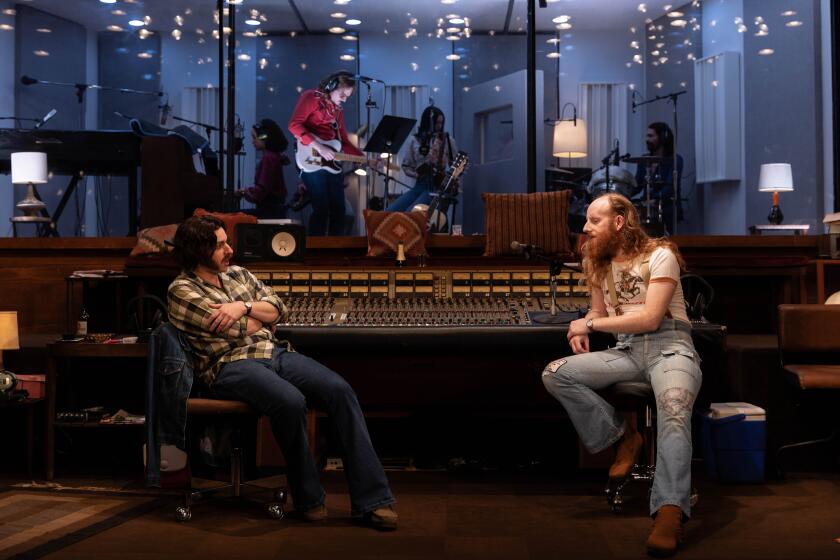
- Share via
At its best, theater explores and exposes the human condition. Usually that means examining our behavior, our hearts and our souls.
But those souls always come with bodies attached, and actors must frequently manage the delicate act of performing bodily functions onstage. Crying and laughing are common but sometimes actors must act out trickier things, like coughing, sneezing, or even vomiting or having an orgasm.
For audiences to believe what’s happening onstage, actors have to meld emotional engagement with physical skills. “These actions need to feel authentic because they’re things audience members have all experienced,” says Isabella Costa, who had to have an orgasm on stage in “An Evening of One-Acts by Ethan Coen,” at the Hudson Guild Theatre. “If it looks like they’re faking it, you lose trust in the actors and the suspension of disbelief.”
Alex Edelman’s ‘Just for Us,’ the genius of Stephen Sondheim and a Tony Award for the Pasadena Playhouse were among the highlights of Los Angeles theater in 2023.
Each actor takes their own track to their tears. Veralyn Jones, who portrayed Mama in “A Raisin in the Sun” at South Coast Rep, says she’s “moved very easily.” After she connects to her character, she says crying onstage comes naturally to her.
As Paris in “Romeo and Juliet: Love is a Fire” at the Santa Monica Playhouse, Gavin Mulcahy had to weep over Juliet’s corpse. To do so, he went to a different place. “I take several minutes of solitude before entering and I bury my face in my arms, simulate unsteady breathing, and embrace despair,” he says. While he has typically relied on his character’s “dramatic stakes,” for this show, he has drawn on personal triggers to find those emotions. “It’s more effective, but also more taxing.”
Meanwhile, Costa calls up painful memories during rehearsals to prepare. “Once I’m onstage, I’m not thinking about when my grandma was sick. I’m present, in the moment, looking at my fellow actor.”
Steven Spielberg, a Broadway show and now a movie musical all have tried to capture the queer love story in Alice Walker’s novel. Here’s how they did it — and why some argue they’ve all failed.
Some actors get teary by staring into stage lights or holding their breath. Esperanza America, who had to cry during a confrontation in Latino Theater Co.’s recent production of “Tacos La Brooklyn,” finds the tears in her voice. “I go to a deeper register vocally in my body and the emotion comes easier,” she says. “Making my voice sound like it’s crying can trick the body into doing it but even if the tears don’t come the audience feels the emotion.”
Daniel Dorr, who broke down in “Baby Foot” at the Rogue Machine Theatre, focuses on his body’s reaction to a tense situation. “If you focus on your breathing and your body, then your body’s alarm bells start ringing — your body doesn’t know it’s a play — and finds the emotions for you. There’s something magical about it.”
Artificially laughing authentically can be more challenging, Costa says, although in the Coen play, she and her co-stars start laughing in the dark, which means they can poke or smack each other before the lights come up. “Then we start giggling and it just feels like I’m laughing with friends,” she says. Another actor in that scene, Harry White, adds that a third actor is a gifted improvisational comedian who always finds a way to provoke a laugh just before the scene starts.
Coughing is easier to fake, but playing a seriously ill character makes it “more dangerous because you can hurt your voice,” says Samuel Garnett, who recently starred in Will Arbery’s “Heroes of the Fourth Turning” at Rogue Machine. Additionally, he says, “coughing for some people, myself included, can induce gagging. So that’s the least fun one.”
Playwright and ‘Succession’ screenwriter Will Arbery’s ‘Heroes of the Fourth Turning’ has its Southern California premiere in a Rogue Machine production at the Matrix Theatre.
None of these actors have ever sneezed onstage, but several say it’s the bodily function that would frighten them the most to perform. “I’m so self-conscious about sneezing,” America says, while Jones says the involuntary nature of it seems daunting. “A real sneeze you feel rise up in you, so I don’t know how to make that sound real.”
Dorr did have to sneeze once for a commercial audition and says, “it was maybe the hardest thing I ever had to do as an actor.”
By contrast, a stage orgasm can be more controlled through technique. Costa’s onstage orgasm was played more for laughs. She is reading a newspaper at a desk and says “Oh my god” six times; at first the audience thinks she’s reading something shocking but when she slams the paper down and changes her breathing and the tone of her exclamations they realize someone’s underneath the desk pleasuring her.
“We wanted it to be in the sweet spot of comedic and realistic — we’re not trying to get the audience aroused,” Costa says, adding that the comic element was more daunting than orgasming in front of an audience. “I get nervous about doing comedy. There’s not a whole lot of physicality at the desk so it came from my breathing and vocals.” (She says, with a laugh, that she did not rely on personal memories for this but did re-watch “When Harry Met Sally’s” famous deli scene.)
Emotionally, the opposite of an orgasm may be a yawn. But Santa Monica Playhouse co-artistic director Evelyn Rudie says that her theater deems the action verboten. “We never have an actor yawn because it immediately sets the audience to yawning and, of course, that’s the last thing you want.”
With Aubrey Plaza, John Turturro and Dianne Wiest on its stages, new musicals from Alicia Keys and Stephen Sondheim and critically hailed new plays by Annie Baker and David Adjmi, downtown upstaged midtown.
Still, some unpleasant actions, like vomiting, require some stage magic in addition to acting prowess to pull off. Garnett’s character in “Heroes,” Kevin, is a blackout drunk. At one point Kevin rushed offstage mid-speech to pee. Upon returning, he was silent for a brief scene before his Exorcist-level expulsion. Garnett foreshadowed the main event by shivering, shuddering and almost gagging in earlier scenes.
While offstage he stuffed his mouth with an oatmeal-applesauce concoction. “We started in rehearsals with applesauce and Diet Coke,” Garnett says. “At some point we mixed blueberries in for chunks and then our director wanted green, so we cut leaves off strawberries before ending up with applesauce and oatmeal.”
Backstage he hurriedly chewed it for “a more believable texture,” shoving as much as possible in without creating a physical strain or giving it away before the outburst. “The vomiting had to shock the audience and make them empathize with Kevin when he’s so low and vulnerable,” he says. “That gave me the strength to stay engaged in the next scene with my mouth full.”
Garnett experimented with gagging sounds to heighten the misery of the moment. “I leaned into getting myself to actually gag, and I’d let whatever sound come out happen,” he recalls. “I was able to pull myself back from the edge before anything actually happened.”
Kevin complained that vomit got in his nose and was stinging so Garnett decided to emphatically blow his nose and cry in the scene’s aftermath for maximum effect.
“My sinuses were fully active,” he says, dryly. “The stage bore it all, seasoning the floorboards. And that’s the theater.”
More to Read
The biggest entertainment stories
Get our big stories about Hollywood, film, television, music, arts, culture and more right in your inbox as soon as they publish.
You may occasionally receive promotional content from the Los Angeles Times.














